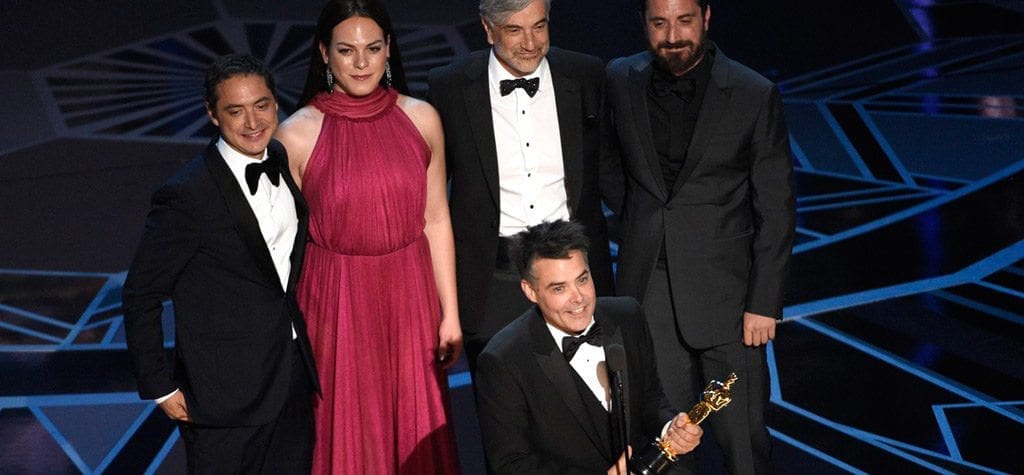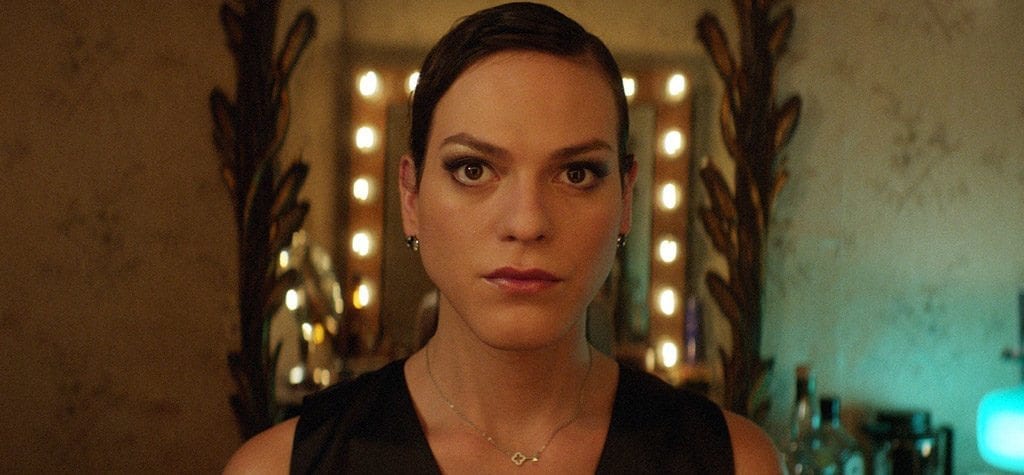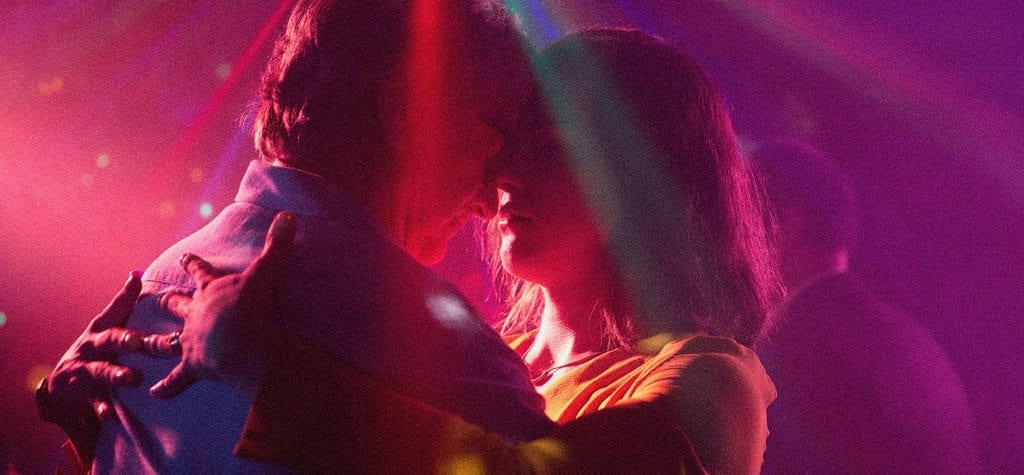
Why ‘A Fantastic Woman’ is the Oscar winner you need to see
When it comes to on-screen LGBTQI representation, Sebastián Lelio’s A Fantastic Woman is an absolute triumph. Following Marina (Daniela Vega) – a transgender woman who faces personal and institutional prejudice while mourning the loss of her boyfriend – the movie offers a benchmark moment in LGBTQI movie history. The Chilean film is radiant and sympathetic, heartbreaking and enigmatic, and though it delves into some of the challenges of transgender identity, it does so without rendering the lead character a tragic one. Instead, Marina is given life and agency where other movies have delivered death and weakness to transgender characters.
The indie marvel is the very definition of a must-see movie, but it’s also one that deserves to be appreciated on the full scope of the big screen. However, between limited theater runs and cinema programming that opts for surefire moneymakers (a la superhero flicks and reboots), it can be difficult for audiences to catch a film like A Fantastic Woman on the big screen. That’s where Best Fest comes in – the U.S. and UK based film festival bringing indie cinema to the people is looking to offer a much-needed solution to the problem by bringing such gems to a larger audience. For its inaugural screening, the exciting festival is set to show A Fantastic Woman to London’s Dalston Rio cinema on May 31. It’s a screening Film Daily urges you not to miss out on. Here’s why:
It offers a powerful story at a critical moment in time
Recollecting his first meeting with Vega to Time Magazine, Lelio revealed the startling answer to his question of what it’s like to be a transgender woman in Santiago right now. “I’ll never forget this. She opened her purse and took out her ID, with her old masculine identity on it, because the state of Chile doesn’t recognize or acknowledge the existence of transgender people . . . I was just in awe.”
The movie offers an unflinching account of that reality and it’s one rarely expressed with such complexity or sensitivity on screen. Transactivist, filmmaker, and photographer Andy González suggested to Vice that the movie has resonated deeply with transgender viewers in Chile as a result. “It is a story that is so human, that speaks of love but also of the discrimination that a trans person receives, which is something we see daily in our community.”
The movie arrived at a significant time for the trans community in Chile. Currently, the Senate is pending approval of the Gender Identity Recognition and Protection Bill, which allows trans people to change their name and gender without requiring judicial permission or gender transition surgery. A movie like A Fantastic Woman might not have the power to change such legislation or discrimination against trans people, but it can offer startling levels of empathy and validity to the lives of transgender people living both in Chile and worldwide.
Showing support for the film also sends a clear message to movie studios that audiences want to see more LGBTQI movies made. As Dana Piccoli – managing editor of Bella Books – suggested on Twitter: “It’s not just about seeing a great movie, it’s about showing up and telling studios we need more films like this, and Moonlight, and A Fantastic Woman. They aren’t easy to fund, and your presence matters.”
It’s won countless prestigious awards

To put it as brazenly as possible, A Fantastic Woman is kind of a big deal, sweeping up the majority of awards for which it’s been nominated. Since February 2017, when A Fantastic Woman was handed the esteemed Teddy Award for Best Feature Film and the Silver Bear for Best Screenplay at the Berlin International Film Festival, the movie has continued to pick up numerous accolades. To date, it’s won Best International Film at the Independent Spirit Awards, multiple prizes at the Havana Film Festival (including a Best Actress win for Vega and the Special Jury Prize), a GLAAD Media Award for Outstanding Film, and the Oscar for Best Foreign Language Film in 2018.
That not only makes A Fantastic Woman the first Chilean entry to win the award, but also the first transgender character-led film to win the same prize and only the second Latin-American movie in history to receive the accolade. Vega also made history at the 2018 Oscars ceremony by becoming the first openly transgender presenter at the glitzy event where she introduced Sufjan Stevens’s performance of “Mystery of Love” from Call Me by Your Name.
A transgender character depicted by a transgender woman

Vega was initially brought on as a consultant for A Fantastic Woman while Lelio and cowriter Gonzalo Maza (Gloria) were developing the script. However, she soon became “the inspiration for the movie” as the director proclaimed during his Oscars speech. Reviewing the movie for The Guardian, Juliet Jacques mused how the lead actor’s experiences gave the film a profound sense of authenticity. “I found Daniela Vega’s stoic responses to endless micro-aggressions far more convincing than they might have been if played by an outsider.”
In the past decade, we’ve seen plenty of cisgender men like Jared Leto (Dallas Buyers Club) and Eddie Redmayne (The Danish Girl) receiving countless accolades and critical plaudits for portraying transgender women on screen. However, it’s still relatively rare to see a transgender character depicted by a transgender actor. It’s rarer still to enjoy a transgender character depicted on screen who isn’t subjected to harrowing amounts of violence or dehumanization to serve the dramatic elements of a story.
It’s enjoyed critical acclaim across the board

A Fantastic Woman is one of those rare films that has garnered endless praise from critics at just about every level. Variety called it a “luminous touchstone work” and praised both Vega & Lelio for their delivery of the story. “It’s a multi-layered, emotionally polymorphous feat of acting, nurtured with pitch-perfect sensitivity by her director, who maintains complete candor on Marina’s condition without pushing her anywhere she wouldn’t herself go.”
Meanwhile, The Atlantic praised the depth of character portrayed at the forefront of A Fantastic Woman. “Lelio’s triumph as a filmmaker is allowing (Marina) to be achingly vulnerable at times and bitterly tough at others: not a cartoon hero or a grieving caricature, but a whole person caught up in one of the worst weeks of her life.” The St. Louis Post Dispatch added that the film offers a rare, dynamic, and relatable story of paramount importance for the times. “Marina represents an experience that hasn’t often been portrayed on the screen, but the emotional turmoil that she must navigate is wholly relatable. In our increasingly polarized time, A Fantastic Woman bridges the gap between ignorance and understanding through the transcendent power of art.”
A Fantastic Woman is truly fantastic in every sense of the word. Miss it at your peril, folks. Buy tickets for Best Fest now.



